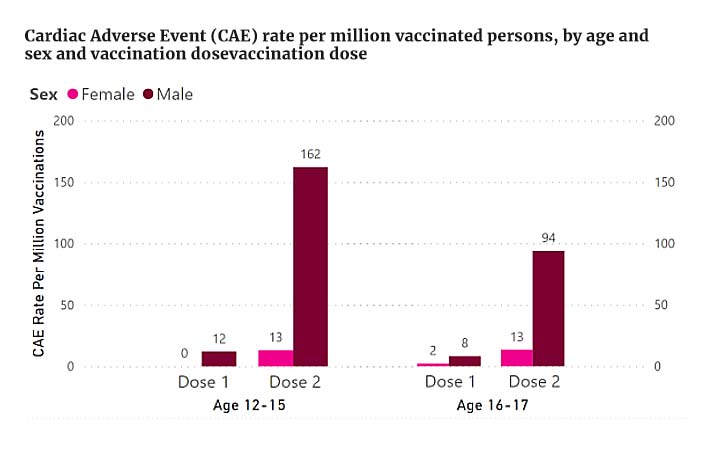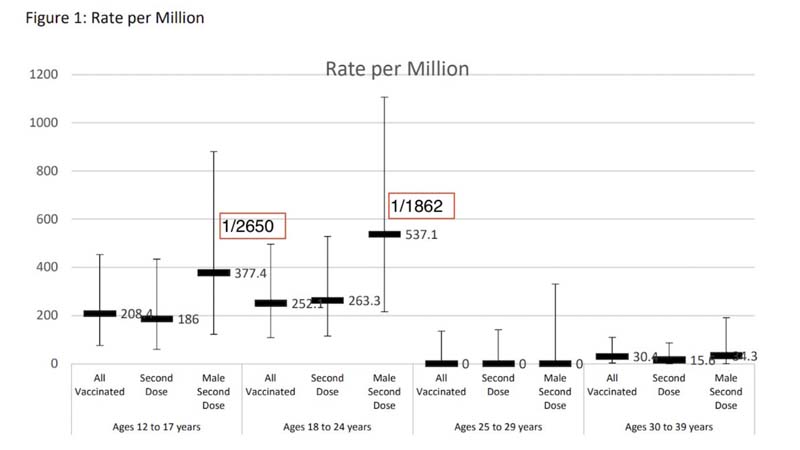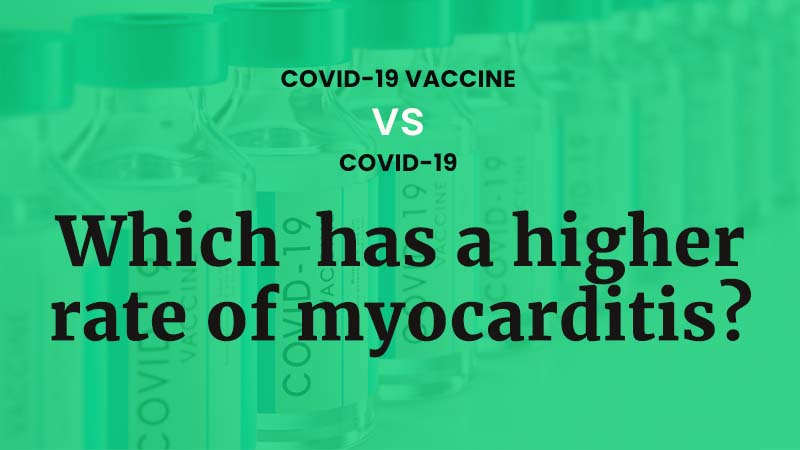Myocarditis is a hot topic of discussion of late as the result of Joe Rogan podcasts, including his recent interviews with Dr. Peter McCullough, Dr. Robert Malone and Australian TV personality Josh Szeps. The topic comes up most commonly when people are discussing side effects of mRNA vaccines. However, myocarditis is also a side effect of COVID-19 itself, which many people are not aware of.
It’s important to understand that in both situations (COVID-19 vs vaccination), the potential risk for developing myocarditis is small. However, myocarditis after vaccination or COVID itself has hospitalized thousands of people. It’s a serious issue that can lead to hospitalization, heart failure, or even death.
Do studies show that there is a higher rate of myocarditis from COVID-19 vaccines or COVID-19 itself?
According to many recent studies, myocarditis affects boys and younger men more than any other group. Considering that the push by almost every government and mainstream media outlet includes vaccinating even young children, it’s especially important to look at studies and data specifically for these demographics.
We found two studies that have been referenced frequently of late, comparing rates of myocarditis in younger males who were vaccinated compared to younger males who contracted COVID. One study says that COVID-19 has a higher rate of myocarditis. However, there are many issues with this particular study as you will read below. The second study concluded that mRNA vaccines cause more cases of myocarditis. Let’s look at both of these studies.
Study 1
The first study we looked at was a preprint paper (not peer reviewed) that was published in medRxiv titled “Risk of Myocarditis from COVID-19 Infection in People Under Age 20: A Population-Based Analysis” by doctor Mendel Singer and others.
Quoted from the study conclusion:
“Myocarditis (or pericarditis or myopericarditis) from primary COVID-19 infection occurred at a rate as high as 450 per million in young males. Young males infected with the virus are up 6 times more likely to develop myocarditis as those who have received the vaccine.“
So, COVID-19 causes more myocarditis than the vaccine itself, right? Not exactly. This can’t be concluded based on this paper because there are many issues with this study that should be taken into account.
Problems with this study:
- No vaccinated people were included in this study. The study looked only at people with COVID and eliminated individuals who were vaccinated. So, the study didn’t actually compare vaccinated vs unvaccinated at all.
- Study is only counting hospitalized patients and not including asymptomatic cases of COVID-19 in the numbers, which means the study has significantly overestimated the risk of myocarditis from COVID itself.
- The study improperly used an infection rate of 9.2% when the CDC estimates for children 0-17 is 35.5% (see table 2). This means the risk rates for children with COVID developing myocarditis is significantly over estimated by nearly 4x.
- Very small total number of people evaluated: 11 boys and 9 girls (20 total) with myocarditis met the criteria to be included in this study. There were six (6) total males ages 12-17 out of 6,846 who developed myocarditis in this study and three (3) total females ages 12-17 out of 7,361. Five (5) males ages 12-15- and 16-19-year-old and six (6) females ages 12-5 and 16-19.
- Mild myocarditis often goes undetected (for both from COVID-19 and from vaccines) so actual myocarditis rates are higher.
- The study used hospital data from April 1, 2020 – March 31, 2021. The FDA didn’t authorize use of vaccines in 12-15 year olds until May of 2021. Yet, the authors still concluded that COVID is more dangerous than vaccines.
Also, it’s important to keep in mind that not everyone gets COVID-19 but every single person who chooses to take it is getting the vaccine. So the risk for hospitalization is even greater in vaccinated groups compared to those who have not taken the vaccines.
This is the study that Josh Szeps was referring to when he was on the Joe Rogan Experience recently. Rogan had stated that the vaccines cause more myocarditis (he was actually referring to study #2 below). Despite all the issues listed above, this didn’t stop media outlets from trying to attack Rogan.

Study 2
The second study is also a preprint paper (not peer reviewed) published in medRxiv titled “SARS-CoV-2 mRNA Vaccination-Associated Myocarditis in Children Ages 12-17: A Stratified National Database Analysis” by doctor Tracy Beth Hoeg and others.
To quote from the study findings:
“For boys 12-15 without medical comorbidities receiving their second mRNA vaccination dose, the rate of CAE (cardiac adverse events) is 3.7 to 6.1 times higher than their 120-day COVID-19 hospitalization risk as of August 21, 2021 (7-day hospitalizations 1.5/100k population) and 2.6-4.3-fold higher at times of high weekly hospitalization risk (7-day hospitalizations 2.1/100k), such as during January 2021. For boys 16-17 without medical comorbidities, the rate of CAE is currently 2.1 to 3.5 times higher than their 120-day COVID-19 hospitalization risk, and 1.5 to 2.5 times higher at times of high weekly COVID-19 hospitalization.“
This study found that boys ages 12-15 were between 4-6x more likely to be hospitalized with myocarditis from vaccines rather than COVID itself. Boys 16-17 were 2-3.5x more likely to be hospitalized.
As found by numerous other studies, the second dose of vaccine was most likely to cause hospitalization.

As mentioned above, this is the study that Joe Rogan was referring to in his exchange with Szeps, as Rogan had recently discussed this study with Dr. Peter McCullough in episode #1747, when McCullough stated “the Hoeg analysis shows that a young boy is more likely to be hospitalized with myocarditis than ever be hospitalized with COVID-19 the respiratory illness.“
Problems with this study
- Study relied solely on events reported to the Vaccine Adverse Event Reporting System (VAERS). VAERS data is not a perfectly clean set of data. It contains errors (duplicates, inaccurate entries, etc.)
- VAERS data is known to be severely underreported.
- Mild myocarditis often goes undetected (for both COVID and vaccines) so actual rates are most likely higher.
- Smaller sample size as only 257 cardiac adverse events were identified.
Other Studies on myocarditis and vaccination / myocarditis and COVID-19
A small study recently also concluded that there was higher myocarditis risk after the second dose of vaccine.

The study, published in December of 2021, identified 14 patients who had developed acute myocarditis or pericarditis within 21 days of receiving a COVID-19 vaccination. The study, titled “Risk of Myopericarditis following COVID-19 mRNA vaccination in a Large Integrated Health System: A Comparison of Completeness and Timeliness of Two Methods“, stated the following:
We estimated a risk of 95.4 cases of myopericarditis per million second doses administered in patients age 12-39 which is higher than the incidence reported to US advisory committees
They study authors also stated: “We identified additional valid cases of myopericarditis following an mRNA vaccination that would be missed by the VSD’s search algorithm, which depends on select hospital discharge diagnosis codes. The true incidence of myopericarditis is markedly higher than the incidence reported to US advisory committees. The VSD should validate its search algorithm to improve its sensitivity for myopericarditis.“
Based on this data and other research on this topic, myocarditis numbers in the U.S. are likely higher than what is currently reported.
Another study out of Israel by Guy Witberg, M.D. and others titled “Myocarditis after Covid-19 Vaccination in a Large Health Care Organization” found that males aged 16 to 29 faced the greatest risk, with nearly 11 out of 100,000 males developing post-vaccination myocarditis.
There are multiple other studies that look at myocarditis:
- CDC study by Tegan K. Boehmer, PhD and others: “Association Between COVID-19 and Myocarditis Using Hospital-Based Administrative Data“
- US study by Katie Sharff, Md and colleagues: Risk of Myopericarditis following COVID-19 mRNA vaccination in a Large Integrated Health System: A Comparison of Completeness and Timeliness of Two Methods
- Danish study by Anders Husby, MD and others “SARS-CoV-2 vaccination and myocarditis or myopericarditis: population based cohort study“
- US study by Dongngan T. Truong, MD and others: “Clinically Suspected Myocarditis Temporally Related to COVID-19 Vaccination in Adolescents and Young Adults“
- U.S. study by Jay Montgomery, MD and others: “Myocarditis Following Immunization With mRNA COVID-19 Vaccines in Members of the US Military“
- Study by Anita Arola, M.D. and others: “Occurrence and Features of Childhood Myocarditis: A Nationwide Study in Finland“
The risk of myocarditis from COVID may be higher than the risk of myocarditis from the vaccine in the general population according to some studies, but in younger people, especially males, the evidence suggests that vaccines pose a greater risk.
For vulnerable populations, vaccines may make sense, but for young healthy individuals, the risks of the vaccine may outweigh the benefits.
